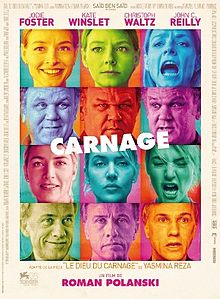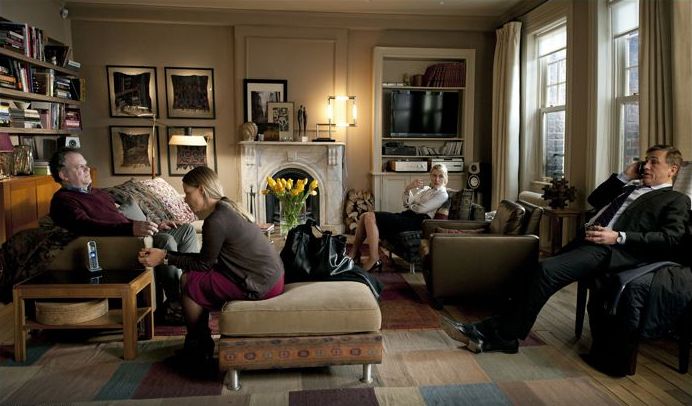
Welcome back to Lost and Found, where we resurrect and reappraise the cancelled television shows of yesteryear. As of this week we’re well underway on Season 2 of this outstanding drama. If you missed the last column you can catch up right here. If you’d like to check out the other shows I’ve covered, you can surrender several days of your life over here. Want to know what I had for lunch? Then follow me on Twitter.
“Requiem For A Gleet” (Deadwood, S2 ep 4)
Wolcott: “Always a choice – to count the saved or the lost.”
Welcome back, folks. I hope your various-and-respective Thanksgivings were filled with too much food and just enough family. We’re knee-deep in Season Two of David Milch’s Deadwood, and this episode – Requiem for a Gleet – deserves a column of its own. Requiem for a Gleet is the worst episode title of the entire series, but it’s a heck of a good episode. It succeeds handily at introducing threats and obstacles to the denizens of Deadwood, deepening already deep characterizations, and holding audience interest while effectively sidelining Deadwood’s most compelling character – Al Swearengen.
Al spends this episode like he spent the last episode – holed up in his office/bedroom/den/batcave and edging toward death via his plugged-up waterworks. Every scene focusing on his wordless, agony-stricken body is loaded for bear with tension and uncertainty. We as an audience are fairly certain that Al can’t actually die – again, he’s the Best Damned Character on this show – and yet there’s never a moment where the peril that Al is in and the pain that he’s suffering feels false, or less than agita-inducing to us (which is to say, me). That’s a nifty, difficult trick to pull off. Also nifty/difficult: the way in which Milch, his writers, and the cast use Al’s relative absence to push the other characters forward and further define them away from Swearengen’s planet-like gravitational pull. Before I explain why Al remains the center of the Deadwood universe, and of this episode in particular, let’s check in with some of them, shall we?
- The character of Ellsworth – played by the moat excellent Jim Beaver – is slowly coming into his own in these episodes. In the first season Ellsworth proved himself to be the ultimate go-along-to-get-along kinda guy. Beaver lent the character a winning nobility, but that nobility was leavened by his sense of self-preservation. It’s no small irony that the man who watched Brom Garret get pushed off a cliff is now overseeing his widow’s claim. Here he chases Wolcott off Alma’s land with a courage that we haven’t seen in him before, and the act makes a lovable character into a lovably admirable character. Previously the definition of “supporting character,” Ellsworth will continue to grow in importance to both the show’s narrative and to its various characters.
- Alma emerges here as an unnervingly and enjoyably vengeful woman who enjoys flexing her new monetary muscle, and the show as a whole continues to expand its portraits of complicated, idiosyncratic women admirably. There are no shrinking violets in Deadwood, nor any one-dimensionally stoic frontier womenfolk. Every female character is given depth and nuance to match if not trump the nuances of the camp’s menfolk. Watching Alma turn the screws on EB evokes admiration for her, and their scene together is laugh-out-loud-funny (a quality that cannot be underpraised with regard to this show. Deadwood may be the funniest “drama” I’ve ever seen).
- Wolcott’s long-awaited woman – the prostitute Carrie – is a surprise to me. I’d expected an innocent naïf – a sacrificial lamb. I’d forgotten how she treats Wolcott, and how he welcomes it. I’d forgotten also his weirdo obsession with Greek myths, which suits his apparent psychosis. Milch and his writers do a nice job as well of making Hearst and Wolcott both into quasi-mythical figures. There’s something insubstantial about Wolcott – something ghostlike and genuinely unnerving despite the character having done little to actually unnerve us. I’ll talk more about this as we delve deeper into the season.
- And what to make of Ms. Ingrisham’s appeal to Silas Adams – her claim that Alma intends to kill her? Hmmmm. Those of you who havent watched the show before, skip down to the next screencap to avoid SPOILERS…
So. Now that we’re alone and the newbies are gone, I can say that I love the uncertainty that Sarah Paulson and the writers create around the character of Ms. I. We the audience know something’s up, because we haven’t heard anything about Alma wanting to kill her before now. But I like how we’re being led here without any indication of what Ms. I’s motivations are, and I like that the show is willing to tease this thread out a bit, letting her story play out over a number of episodes. When it comes to stories, for me the intrigue is usually sweeter than the payoff (see: Lost).
- …What about Seth and Martha Bullock, you ask?
Well, for one, Seth and Sol discuss setting up a bank and involving Al or Alma in it as provider of the necessary capital. Nearly every conversation in this episode is infected with gold, or money, or wealth, and while that’s true for most of if not all of these episodes I felt it strongly in this one particularly. Interestingly (to me), the real Sol Star never started up a bank in Deadwood – but he was appointed as postmaster for the town, a position taken by Charlie Utter in this fictional recreation.
Martha Bullock: “I would enjoy to converse in the stillness after the day like that.”
Everything about Martha and Seth’s interactions in the first scene is amaaaazingly awkward, from the body language to the stilted way they speak to each other. And why shouldn’t it be awkward? Seth is sharing a bed with his brother’s widow and the two of them, who’ve spent – for all we know – absolutely no time together before this, have to figure out how to be Man and Wife. I enjoy the way that Milch and his writers bend words to their purposes. Using “intercourse” in this context carries a dual meaning that operates as a kind of mini-mission statement. To engage in intercourse is to fuck, but it’s also to communicate. Seth and Martha have begun to truly communicate right around the time that they begin shtupping.
I adore the choice to have Bullock and by extension the show close the door to us in a moment of uncertain intimacy. Contrast that approach with what we’ve seen of Seth and Alma, who were displayed to us as if liberalizing their naked hunger.
- Speaking of things I adore: I love that Cochran contemplates and nearly goes through with a procedure he’s never actually performed. Brad Dourif sells the heck out of his scenes and much of the awful, growing tension in Al’s scenes is courtesy of his performance and that of W. Earl Brown as Dan Dority.
Most of Deadwood’s “main” characters get a boost from Al’s absence here, and yet ultimately this episode as a whole is defined largely by Swearengen’s absence and affliction. And with that observation, allow me to segue into a long rambling imaginary-beard-stroking monologue:
Al’s condition demonstrates just how important the man is to Deadwood’s stability, and how relatively-benign he is compared to the amoral monstrousness of Tolliver or Wolcott, or the malign officiousness of Hugo Jarry, the latest politician to enter Deadwood (played by the great Stephen Tobolowsky, whose voice is his passport, and who dated your sister Mary Pat a couple of times until you told him not to anymore). That’s a strange thing to write, but it feels like the truth and it’s a testament to the skillful characterization of Milch and his writers. Despite Al’s murderousness and callousness, his constant self-interest, we as an audience have now been witness to Al’s kindness (twisted as it is) and we’ve come to understand and even to like him.
Al acts throughout the show to maintain control, but in the process he draws others in and adapts to his advantage among them, displaying oddly affecting compassion and vulnerability, and a grudging sentimentality that feels all the more genuine for being so truculent. Al’s circle has grown over the course of the show so far, encompassing folks as unexpected as Seth Bullock. Compare that growth to Tolliver’s circle, in that Tolliver doesn’t have a circle. He’s driven away Joanie and Eddie Sawyer, and alienated a General in short order. Had Tolliver been laid up the way that Al is I don’t know that he’d have had a man to stand by him the way that Dan, whose continuing loyalty to Al was cemented in the last episode, does here. The only man Tolliver is truly tied to as of this episode is a quiet psychopath – one who chooses to count the lost, and not the saved.
None of which is to say that Al’s not a monster, a devil, but I’d argue the cliché about the devil you know being better than the devil you don’t definitely applies here. We (and by we I mean me) find ourselves rooting for Al because there’s a sense that Al has an albeit-reptilian desire to protect his home. He’s literally invested in it.
The phrase “in bed together” is used to describe people who are in cahoots – people united by a common goal. It’s usually used disparagingly, as in “Fox and the Republican Party are in bed together” (send your complaints over any perceived political potshots to GrowSomeThickerSkin@gmail.com). The shot of Al, Trixie, Dan, Johnny and Cochran at the top of this column, taken from this episode and illustrating a moment in the successful effort to expel Al’s stones, literalizes that expression – showing us a group of characters all operating to the same end and, for a moment, actually in bed together.
When you’re part of a larger community, a place like Deadwood where you have no choice but to find ways to live together, that community itself is your home. Al needs Seth. He needs Cochran and Merrick and Wu for business or politics or public relations or body disposal. Dan and Johnny and Silas and yes, Bullock and the rest of them need Al. And because he needs them, Al looks out for them. Because they need him they look out for him. Tolliver would just as soon burn the camp to the ground if it meant he’d turn a profit.
And so without Al around prowling the Gem and cutting his deals and dealing with a lot of fucking things he doesn’t want to do the camp finds itself prey to a newer, crueler breed of predator. It’s a good thing that this episode ends with the promise of Al on the mend, because the town needs him now more than ever.
And now, in lieu of Stray Bullets this week, I give you a crapload of great quotes:
- Wolcott: “You have the advantage of me, Mr. Ellsworth.”
- Ellsworth: “That ain’t a possibility, Wolcott – no more than an error of yours would be innocent.”
- Prostitute: “Well? Whatever were you aimin’ at?”
- Hugo Jarry: “Your tittiiiiiiiiies!!!”
- E.B.: “One perseveres. One is an asshole if one doesn’t.”
- Ellsworth: “The Creator, in His infinite wisdom Mrs. Garret, salted his work so that where gold was there also you’d find rumor.”
- Ellsworth: “Panic’s easier on the back than a short-handed shovel.”
- Wolcott: “I sense Ms. Stubbs has fucked a relative.”
- Carrie: “It’s a big club.”
- Cochran: Whiskey does not steady the hand. It just dulls the worry over the hand’s unsteadiness.”
- Wolcott: The noise is terrible, isn’t it, Mr. Ellsworth? Like fate.”





 God of Carnage – a play by French writer Yasmina Reza, about two very different pairs of parents who meet-up to maturely discuss an altercation between their young children, only to descend into juvenile conflict themselves – made a sizable splash on Broadway in 2009. It won the Tony for Best Play, and Jeff Daniels, Hope Davis, James Gandolfini and Marcia Gay Harden all received nominations, with Harden taking home a prize. The play’s evenly-sized foursome of bickering and uniquely foibled characters is an ensemble wet dream for a producer trying to attract good actors for a film adaptation. As is the play’s real-time flow and single location (no costume changes! only one small set!). Of course, while that small single location may give a producer a warm fuzzy feeling in his swimsuit area, that isn’t exactly the most seductive format for a motion picture audience. Carnage, Roman Polanski’s film presentation of Reza’s play, remains faithfully and impossibly small in its scope, barely spanning a single afternoon, featuring only four speaking roles, no major plot twists or developments, and never leaving the confines of an apartment living room — it could not feel any more like a play unless it had been shot on a stage from a single angle. Unlike George Clooney’s Ides of March, which took Beau Willimon’s Farragut North and added new characters and radically changed the storyline to make it more movie-like, Polanski treats Carnage as though he had been hired to stage a revival of the play. Which means that for better or worse (depending on your tastes in movies), Polanski’s Carnage offers up the exact same treats as Broadway’s Gods of Carnage: sharp dialogue chewed and spewed by great actors. The performances soar in the small apartment, but in the end you may be left wanting more.
God of Carnage – a play by French writer Yasmina Reza, about two very different pairs of parents who meet-up to maturely discuss an altercation between their young children, only to descend into juvenile conflict themselves – made a sizable splash on Broadway in 2009. It won the Tony for Best Play, and Jeff Daniels, Hope Davis, James Gandolfini and Marcia Gay Harden all received nominations, with Harden taking home a prize. The play’s evenly-sized foursome of bickering and uniquely foibled characters is an ensemble wet dream for a producer trying to attract good actors for a film adaptation. As is the play’s real-time flow and single location (no costume changes! only one small set!). Of course, while that small single location may give a producer a warm fuzzy feeling in his swimsuit area, that isn’t exactly the most seductive format for a motion picture audience. Carnage, Roman Polanski’s film presentation of Reza’s play, remains faithfully and impossibly small in its scope, barely spanning a single afternoon, featuring only four speaking roles, no major plot twists or developments, and never leaving the confines of an apartment living room — it could not feel any more like a play unless it had been shot on a stage from a single angle. Unlike George Clooney’s Ides of March, which took Beau Willimon’s Farragut North and added new characters and radically changed the storyline to make it more movie-like, Polanski treats Carnage as though he had been hired to stage a revival of the play. Which means that for better or worse (depending on your tastes in movies), Polanski’s Carnage offers up the exact same treats as Broadway’s Gods of Carnage: sharp dialogue chewed and spewed by great actors. The performances soar in the small apartment, but in the end you may be left wanting more. 



 With
With  My weird Trek-crush aside, I don’t want to sell Eve short. She’s got the chops to play something far meatier than space cleric. And she’s been floating around genre roles for awhile, as she originally was up for the role of White Queen in X-Men: First Class before bowing out of contention. If the plan is to continue onward with Spock and Uhura’s relationship, then I suspect whatever role Eve plays will automatically be a love interest for James T. Kirk. Must be a tough life that Chris Pine leads…
My weird Trek-crush aside, I don’t want to sell Eve short. She’s got the chops to play something far meatier than space cleric. And she’s been floating around genre roles for awhile, as she originally was up for the role of White Queen in X-Men: First Class before bowing out of contention. If the plan is to continue onward with Spock and Uhura’s relationship, then I suspect whatever role Eve plays will automatically be a love interest for James T. Kirk. Must be a tough life that Chris Pine leads… If you had any thoughts that the latest attempt to remake Evil Dead would become varporcinema like the rest, let go of your breath: Raimi’s GhostHose has partnered with both Sony and Film District to put the film in theaters once it’s completed. The film is slated to shoot early next year with a script most-recently modified by Diablo Cody to be directed by Fede Alvarez, and it will now hit theaters across the states and around the world thanks to the new partnership.
If you had any thoughts that the latest attempt to remake Evil Dead would become varporcinema like the rest, let go of your breath: Raimi’s GhostHose has partnered with both Sony and Film District to put the film in theaters once it’s completed. The film is slated to shoot early next year with a script most-recently modified by Diablo Cody to be directed by Fede Alvarez, and it will now hit theaters across the states and around the world thanks to the new partnership.